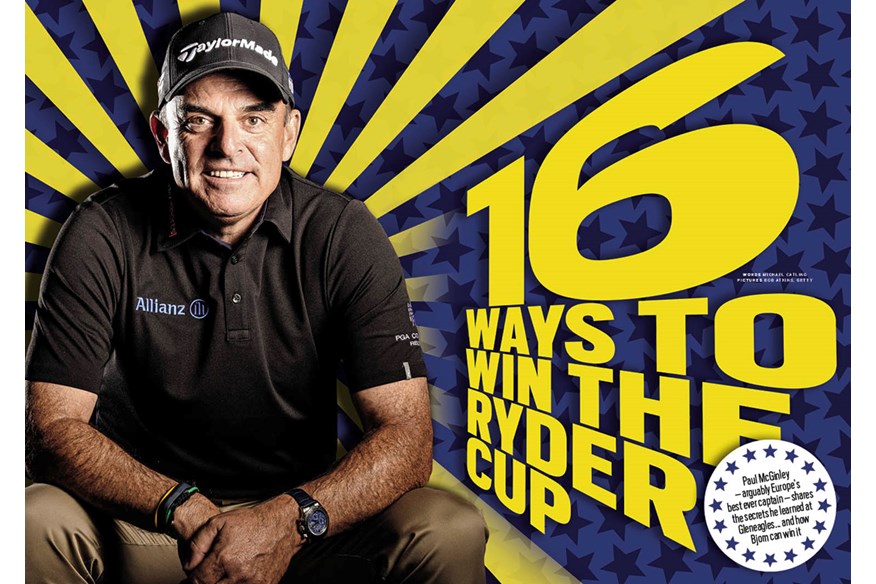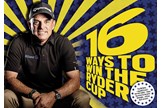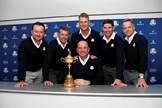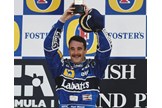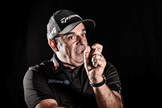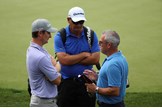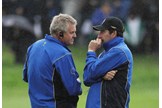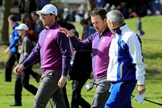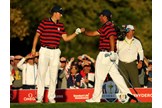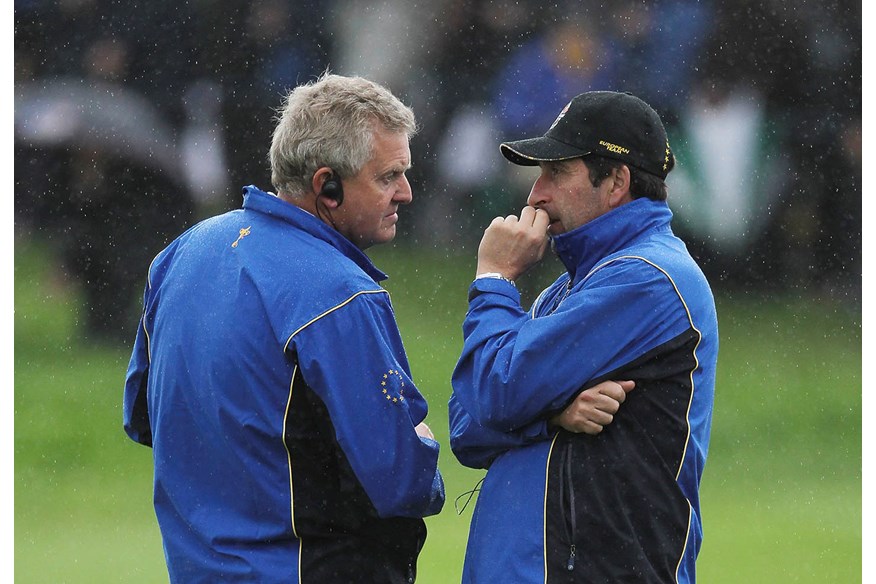RYDER CUP: 16 things Europe must do to win it, by Paul McGinley
Last updated:
Paul McGinley is one of Europe’s most successful Ryder Cup captains ever, a man who brought a new way of doing things to Gleneagles in 2014.
He brought an inspirational and analytical approach to the captainy, leaving nothing to chance. Every detail was worked out in advance; pairings, course set-up, motivational messages in the team room, running orders for each session, mentors for the rookies, inspirational speakers… even putting a picture of Seve and other Ryder Cup legends on the wall of the tunnel to the first tee.
It worked too – his team wiped the floor with Tom Watson’s men. So we couldn’t think of anyone better to ask what Europe and Thomas Bjorn in particular needs to do to win in Paris. Take it away, Paul.
1. Be your own man
I said this to Thomas – and to Darren during his captaincy – that there’s no one way of captaining. To give you two examples, Olazabal and Monty were two very different captains before me. They saw things in a different way but they both won. When you do what you see fit, you bring integrity to the table and having belief in what you’re talking about. That’s the biggest key to being a captain. You really must believe in yourself and have that authenticity and integrity of message.
2. Use stats sensibly
In 2010 and 2012 under Monty and Olazabal, I was the stats guy. It was just basic research, and relief on using Shotlink and European Tour data. Players were ranked from one to 12 based on who was the best putter, who was the longest driver, who was the straightest driver. I also ranked players according to how they had performed in teams before. What I was conscious of, however, was that you can easily bamboozle and confuse players with data. As a result, data started with me and finished with me. It never reached the players, unless I wanted to use it in a conversation with them. Now, data plays an even bigger part in shaping a captain’s decision making, and helping the vice captains. We employed a full-time data team – Strokeaverage.com (Bjorn is using the 15th Club). But every time I met them, I sent them an email saying you’ve got 10 minutes and a one pager. Anything more than that, you lose yourself in science. It wasn’t because I didn’t have time, I just wanted to focus on the big details, rather than the minutiae. Again, it goes back to keeping things simple.
3. Don’t be too proud to ask for help or an opinion
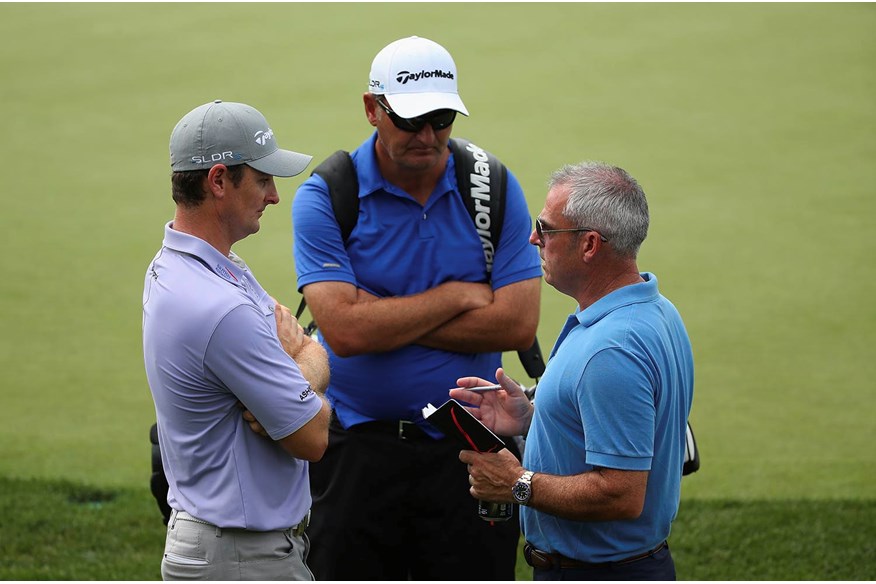
The best captains I’ve had always asked players to share ideas about potential partnerships. What did they think? How did they think? It’s important to gather as many opinions as possible, because you might have missed something. A great example was in 2004. Padraig and I were playing Tiger Woods and Davis Love III in the foursomes on Saturday afternoon at Oakland Hills in Detroit. We won 4&3, and we had a massive Irish American crowd following us – people from Detroit, Chicago, Boston, New York. On the way back to the hotel, we were all celebrating and Caroline Harrington said, ‘you know what, Bernhard Langer should put you both out in consecutive matches tomorrow because that huge Irish support can follow both matches and that noise can stay between you two. It can be a big European voice.’ We thought it was a great idea and when we suggested it to Bernhard [Langer], he agreed. We went out at 11 and 12 the next day and won both games. So, there was Caroline Harrington, forming the European strategy.
4. A democratic leadership style works best
It’s really important not to have the arrogance that you know everything as a captain. It’s important to keep your ears open. That doesn’t mean you have to communicate everything you get to the team. Far from it. You need to filter everything as a captain and then communicate very simply with the players. Players needs clarity, they don’t need clutter.
5. Fail to prepare; prepare to fail
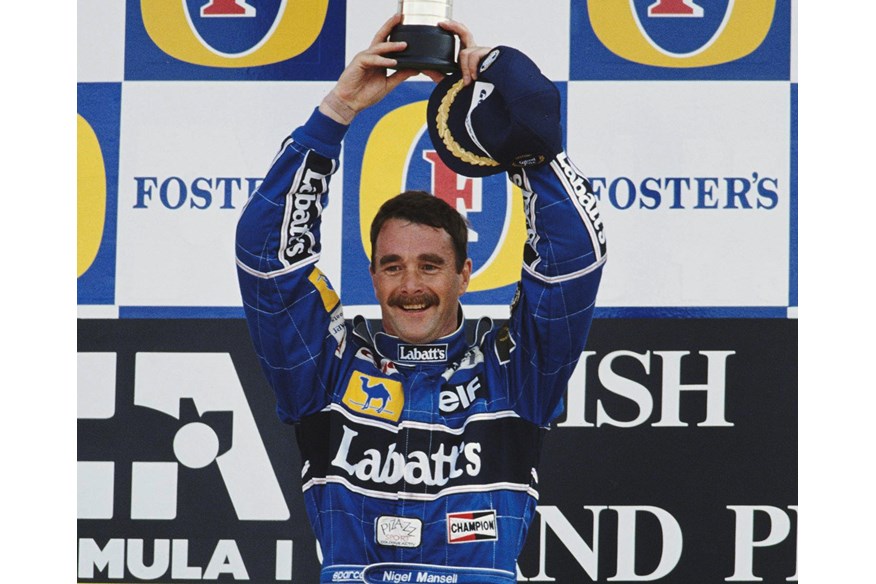
Team selection and strategy is very much score dependent. I will give an example. Way before I was Ryder Cup captain or even thinking about it, I met Nigel Mansell. He was still driving in Formula One and Eddie Jordan suggested I should meet him. He’s since become a very good friend, but I remember he said something which was very insightful. Whenever he was on pole position in a race, that night he would go to a quiet room and start thinking about the following day and build a strategy. If he got a good start, he would take this position on the track ready for the first corner. But if he got a slow start and the driver behind went on the inside, he would go here. But then if he went on the outside, he would position his car here. In other words, he had three or four different scenarios going into the first corner, dependent on how he started. Then, in the heat of competition, he wouldn’t need to think on the spot because already got pre-thought out strategy. I brought a lot of what Nigel said to me into my captaincy. I had so many different scenarios thought out. You need to be proactive, not reactive. The only thing I had clear in my mind was that Graeme McDowell would play No.1. I told him that about two weeks in advance and he was sworn to secrecy that no one else would know.
6. Don’t leave people fretting over their role
The week before the Ryder Cup in 2002, there was a WGC event on at Mount Juliet. I wasn’t playing well enough to get in, and neither was Lee Westwood. Sam Torrance took us up to The Belfry while the rest of the team were playing in Mount Juliet. All the stands were up and Sam had the course prepared perfectly for how it would be. We played a casual round and on the way back, Sam was sitting with me in the backseat and told me the whole plan for the week, how many matches I would be playing, who I would be playing with, and what my role in the team was. Now, he said, that role could possibly change, but I’m setting out my stall that you will play foursomes the first day, foursomes the second day. That’s my plan. For me, that was a big weight off my shoulders. All the anticipation – am I going to play, am I not? – was gone. All I needed to prepare for was foursomes with Padraig. I thought that was great man management. That’s what I did at Gleneagles. The players knew what the Plan A was at the start of the week, so they could plan in principle.
7. Make wise choices on the pairings
If Ian Poulter is Mr Ryder Cup, Justin Rose should be his deputy. As a team, they’ve won four of five matches for Team Europe and finished fourth and second in the Golf World Cup. More recently, though, their partnership has been split up, with Rose and Henrik Stenson leading off the fourballs in the last two editions and delivering four points from six matches. The former neighbours did, however, lose out to the team of Patrick Reed and Jordan Spieth two to one at Hazeltine, so a change may be in the offing. History shows that captains tend to partner a rookie with someone experienced and in the case of Alex Noren and Jon Rahm, it would make sense to put them with fellow countrymen Stenson and Sergio Garcia respectively. One option would be to split the Spaniards up in the afternoon, with their aggressive styles better suited to complementing the accuracy of Tommy Fleetwood or Francesco Molinari tee-to-green in a better-ball format. Perhaps the biggest permutation facing Bjorn is what to do with Rory McIlroy. One solution – which could solve two problems – would be to stick Poulter with Rory in a throwback to 2012 when they went undefeated. Whether Bjorn will opt for such an experienced pairing may depend on who receives a wildcard pick. Rory has made no secret that he wants Thomas Pieters beside him for the “next 20 years”, but that owes more to the three matches they won together at Hazeltine rather than the Belgian’s recent form, which is sketchy at best. Throw the names of Paul Casey, Matthew Fitzpatrick, Tyrrell Hatton and home favourite Alex Levy into the mix and a couple of big names could miss out.
The most prolific Ryder Cup pairings
EUROPE: Rose/Poulter 4-1-0; Rose/Stenson 4-2-0; McIlroy/Pieters 3-0-0
USA: Reed/Spieth 4-1-2; D Johnson/Kuchar 3-1-0; Fowler/Mickelson 1-2-0
8. Draw on past experiences
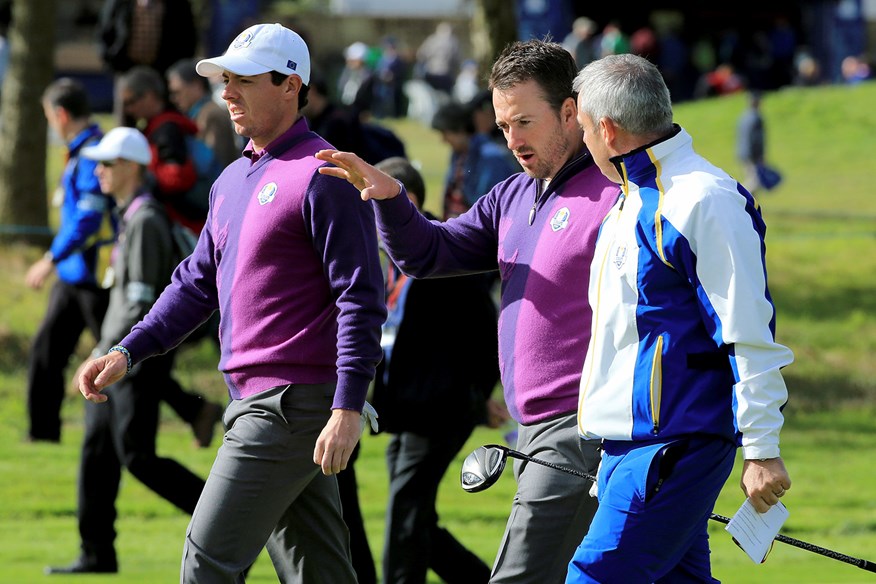
One thing which is rarely written about or talked about was that I had two goes at being a Seve Trophy captain. Twice we were massive underdogs, and twice we won. That’s where I got my confidence from. The stuff I tried out first time when I was captain had worked. The players got it, and my man-management and tactics were good. When the players stood up for me, like Rory, Luke Donald and Ian Poulter, at Gleneagles, it was because they had been in the team room with me as captain and had obviously seen something. That’s where my credibility came from. The great thing about Thomas is that he’s got so much experience. He’s been a vice captain four times, and won as a Seve Trophy captain. The players know him, he knows what works and what doesn’t, and that counts for a lot.
9. Pick the perfect No.1 for the singles
I’ve always been a believer that the best player doesn’t necessarily go out first. Why? Because they’ve got nowhere else to go but win. The streetfighters, the guys with a massive heart – people like Manuel Piñero, Lanny Watkins – make and have made great No.1s in the past. But in order to get the streetfighter in the right frame of mind, you need to prepare them. Don’t surprise them on the Sunday night. They need to be psychologically prepared. No.1 in the singles, irrespective of the score, is a very, very important decision. It’s like the first tackle in a soccer match. That impression you put on the opposition. It’s all about building momentum. It’s a cliché I know, but it has a massive impact when it comes to team sports. That’s why I played Graeme only once on the first day, and once on the second day. I wanted him fresh going into the singles.
10. Manage the team, not just the eight playing
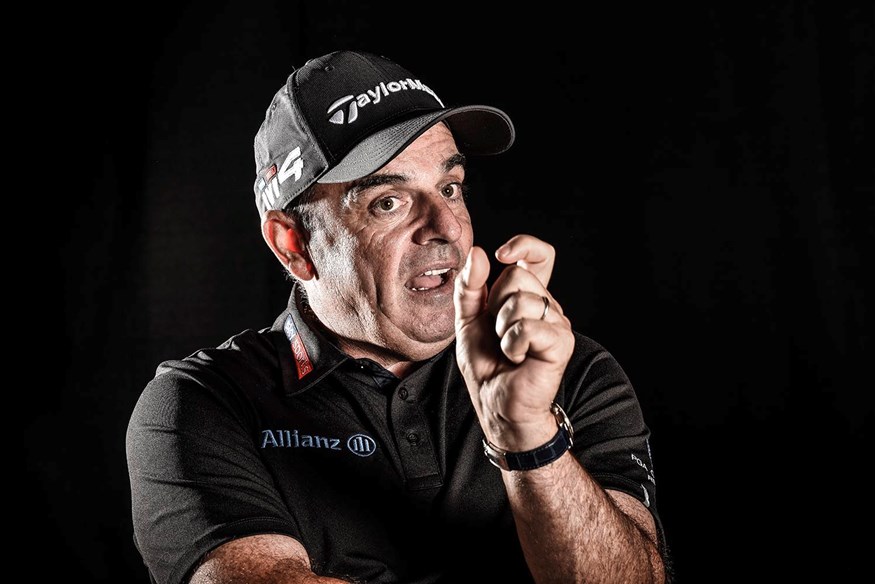
Picking the eight players to play is easy. It’s managing the four who are not on the course that is the hard bit. That’s why I coined the phrase, wave after wave of attack. I got the concept from Gaelic football. There’s a team called Donegal. They were the equivalent of Leicester City, and won the [All Ireland] Championship in 2012. Their coach at the time was Jim McGuinness. His view was that if you start with your hard forwards and wear down the full backs, you then bring on the nippy forwards and take advantage of the tired defence. So, while you don’t start with the leading 15, you finish with them. When I became captain, that’s what I talked about in the team room. The eight guys who went out first weren’t necessarily the best in the team. They were the best suited to sit that part of the exam. I would tell them that ‘there’s loads of papers to go, and to win the Ryder Cup we need to go through them together, wave after wave.’ It was a case of wearing down a very strong American team.
11. Trust your deputies
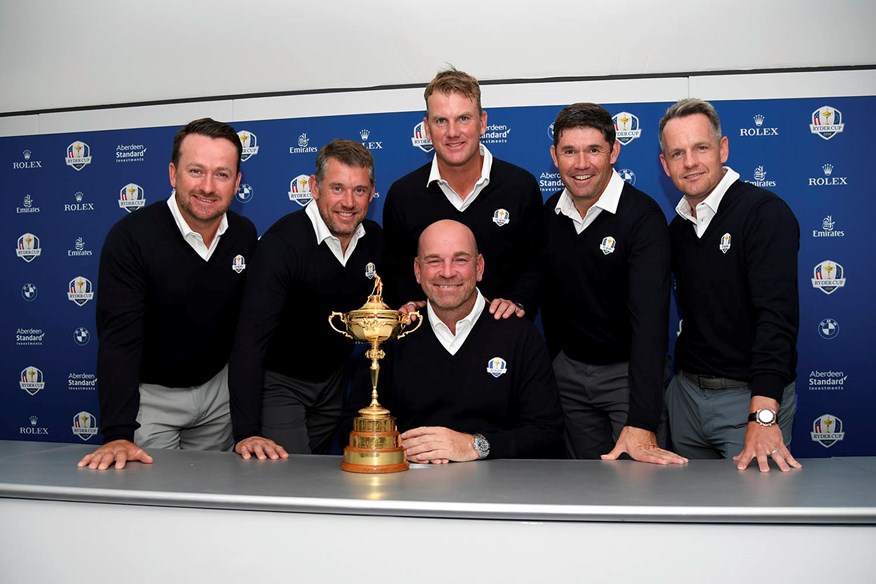
The vice captains never get much credit, but they are the unsung heroes. The fifth captain is perhaps more important than ever. The four vice captains tend to follow each game, which leaves four guys back in the locker room on their own. Who’s managing them? Who’s making them feel a million dollars? Who’s making them feel part of what’s going on on the course? In the afternoon matches at Gleneagles, we beat America 7-1 and a lot of that was because of the job Des Smith did as the fifth captain. I remember seeing Lee Westwood on the first tee and I knew straight away he was ready to get that point on the board. Again, it goes back to momentum and making sure everyone can hit the ground running.
12. Keep the team meetings concise and clear
One of the biggest frustrations I had playing in the Ryder Cup was the uncertainty of when the team meeting was. People would guess and tell you different times, and it wasn’t very conducive to creating a relaxed environment. When I was captain, there was a buffet from five until 10 and people could have physio or do what they wanted in between. But everyone knew that there was a meeting at 9pm every night. It was never longer than 10 minutes because only so much applies to every player. Any other communicating was done on one-to-one level by pulling a chair across when they were having dinner or grabbing them in the corridor.
13. Replicate a European Tour course set-up
We’re a European team and most players are members on the European Tour, where the courses are set up very differently compared to the PGA Tour. The fairways are a bit narrower, our rough is a bit higher and the greens are a bit slower. As the home captain, you can have your say on the course set-up until the Monday before the Ryder Cup. But the most important conversation I had with David Garland, the European Tour’s Director of Operations, was a year or so before the Ryder Cup when I said I wanted a European Tour set-up. Nothing else. It was a case of keeping things simple, and what people are used to.
14. Pick the wild-cards wisely
I’m a believer in horses for courses. Players are suited to certain tests. The first meeting I had with the statistics guys as captain, I asked them to trawl through the last 10 years of the Johnnie Walker Championship, played at Gleneagles, and identify three or four correlations as to who played well and what they did well that week. Was it big hitters? Was it great putters? Did they just play par 5s well? Once I had that information, it really helped me to determine my pairings. At the Players Championship, Webb Simpson ranked first in driving accuracy, but he was last in driving distance. That was perfect for TPC, but if he repeated those statistics at somewhere like Quail Hollow he would probably miss the cut. That just shows that some players are suited or ill-suited to a certain type of golf course. Thomas Bjorn may pick who many consider to be a surprise wild-card, but there’s a lot of research which goes on behind the scenes and influences your decision makings.
15. Use other tournaments to your advantage
It’s well documented that I could control the draws on the European Tour, and put players together with a view to them being partners. Lesser known is that I was asking caddies what they thought about a player’s game and their strengths and weaknesses. As loyal as they are to their player, they always have their best interests in mind and are not as emotionally involved. There are three or four different caddies in particular – really experienced ones on Tour – who I asked for views on their own players and other players. Whereas, I know other captains have gone out and played with certain individuals in the last few weeks of qualifying. Darren did that with Thomas Pieters, and that was one of the reasons he picked Thomas. The important thing is not to rely on just what the stats say. You need to do your own research because they don’t always reflect how someone plays at specific moments.
16. Pre-empt a fightback
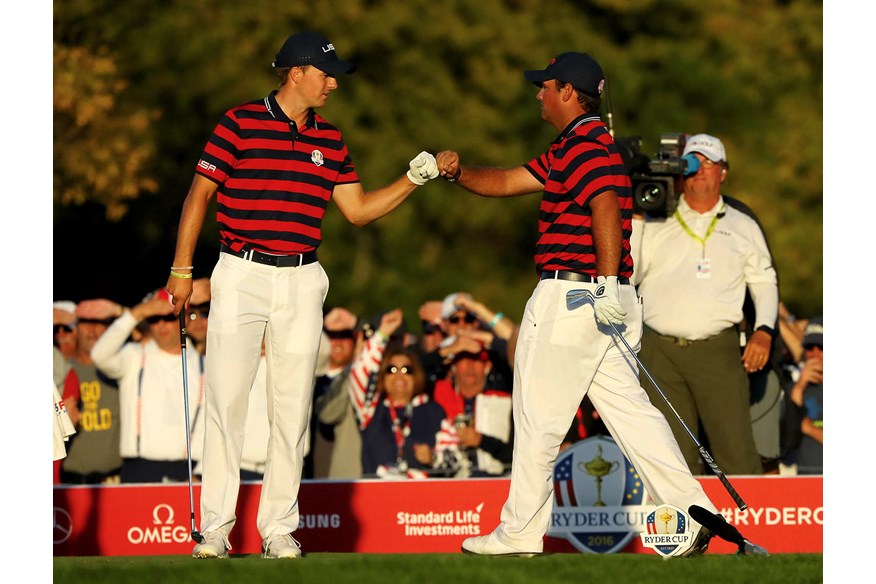
Going into the singles, we had a four-point lead and all my team talks were about complacency and expecting to see the Americans go up in the first few games. If you are prepared for it, it doesn’t rock you as much and you can come out the other side. I learned that from Jesper Parnevik. He talked to me as a rookie in the 2002 and he said, ‘just be ready for the singles, Paul, because it’s a very lonely place.’ When you play in the matches on Friday and Sunday, there are only four groups out on the course and the noise and intensity is high. The singles is strung out over 12 matches. I was playing at nine, and most of the crowd were following the first few games. I did think where’s everyone gone, but Jesper had prepared me for that. I was playing Jim Furyk and when I was waiting for him to putt on the 3rd green, I counted just 24 people watching. That sounds funny, but it was scary at the time. But I thought back to what Jesper said, knowing that the games ahead would finish and people would start following me. That could have flustered me, but it didn’t because I was psychological prepared and pre-empted what was going to happen. It was the same with Graeme McDowell at Gleneagles. He went three down after five holes to Jordan Spieth and then went on to beat him 2&1 because he didn’t panic.
McGinley on…
The team spirit
The difficulty of being a Ryder Cup captain is that you only inherit them once every two years. You don’t even have a chance to get them in the same room at the same time. The fedexcup playoffs are on the week before, but they’re getting prepared for that. You don’t want to drag them away. The best way to prepare for the Ryder Cup is by ensuring their focused on their own games. Golf is an individual sport. They are not used to sitting down and fostering team spirit. They are born and bred individuals, so trying to create a false team spirit isn’t right.
The recent success of Team USA
“Team USA are not only strong, they are arrogant. They are getting a bit cocky and full of themselves again after going so well the last time. They are very much buoyed by the success they’ve had in the last three team events they’ve played. They’ve won two President Cups and one Ryder Cup since Gleneagles, so lessons have been learned. They’ve got a great team, but we have the best team we’ve ever produced. Our average world ranking will probably be around 12. At Hazeltine, it was 28. What an improvement that is.”
Europe being the underdogs
“Are we? I think Darren had a transitional team, but we don’t have one now. Take the stalwarts of Sergio, Henrik, Justin and Rory as the four kind of pillars in the team. Then you put Paul Casey back into the fold with all his experience, Jon Rahm, Tommy Fleetwood and then guys like Tyrrell Hatton who’s been a big star on the European Tour over the last couple of years and had a lot of success. Poulter could well be in the team. Alex Noren is one of the brightest stars in world golf. I’m now looking at the team thinking, where’s the weakness? Yes, we are strong one to six. We’ve always been strong one to six, but where this team is really strong is seven to 12. If you put in Thomas’s experience and home advantage, we’re in a very strong position. But we won’t be complacent. Thomas has been around long enough to know September will be really tough, despite how good the team is.”
Making mistakes
“I still look back with regret at the way I managed Stephen Gallacher and Ian Poulter at Gleneagles. Stephen made the team at the 11th hour. I took my eye off the ball and wasn’t as prepared as I was with Victor Dubuisson and Jamie Donaldson, who I knew were making the team well in advance. What I tried to do was to take the two players, who I hadn’t prepared very well, together in the first morning. I wanted Stephen, who was a rookie, to play fourball because it’s a lot easier to play your own ball. I thought, here’s a guy playing on home soil, on his Ryder Cup debut, what experienced player will be able to feed off that electric atmosphere? Poulter seemed like the obvious pick. But I only made that decision the week earlier. I hadn’t prepared either of them. I still feel I let both of those players down.
The secret to his captaincy at Gleneagles
It was experience more than anything. I was incredibly fortunate to be in an era of European golf when we had great teams, great captains and great success. Between captaincy and playing roles, I think I was involved in 21 teams and won 20 times. I played under Seve, Monty, Faldo, Olazabal, Sam Torrance, Ian Woosnam – a who’s who of European golf. I learned a bit from everybody in terms of how to captain, what was good from their point of view and what I would have done differently. Basically, my captaincy was a mixture of all those things. It wasn’t any one idea or a particular secret. It was a lot of different ideas, on a lot of different levels.
Home advantage
“It’s massive/ Seventy five per cent of home matches in the last 10 years of the Ryder Cup, Solheim Cup, Presidents Cup and Walker Cup have been won by the home team. The home team is becoming more and more relevant to success in team events. That’s why it’s so difficult to win away from home. That’s why Darren had such a tough task, especially with six rookies.”
Branding Rahm and Fleetwood as rookies
“Let’s get away from that phrase. I don’t see Jon Rahm as a rookie. He is so experienced. I don’t see Tommy Fleetwood either. He’s the European No.1 and has won big tournaments. The same goes for Alex Noren. They may be rookies by name, but not by game.”
